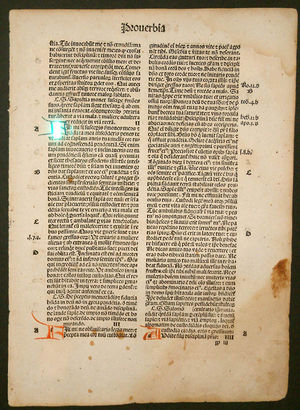Incunabulum
An incunabulum (plural incunabula; from the Latin for "in the cradle" or "swaddling clothes") is a European printed item (such as a book, a single sheet, or an image) produced before 1501. The term is sometimes Anglicised as "incunable".
The term was coined in the seventeenth century by book collectors to refer to the earliest printed European books. The first known use of the term is in a 1639[1] pamphlet by Bernhard von Mallinckrodt, De ortu et progressu artis typographicae ("Of the Rise and Progress of the Typographic Art") (Cologne) in the phrase "prima typographicæ incunabula" ("the first infancy of printing"). Von Mallinckrodt defined this infancy as ending in 1500, and his definition is still used, although it coincides with no change in printing techniques or technology.
The invention of metal-type printing is generally attributed to Johann Gutenberg (c.1400–1468).
Sources and external links
- "An Introduction to Incunabula" by Phil Barber at www.historicpages.com
- "Incunabula: Dawn of Western Printing" — National Diet Library, Japan
- "Icunabula et cetera" — introduction from Psymon
- Incunabula collections at the British Museum
- The Rare Book & Manuscript Library at the University of Illinois at Urbana-Champaign
- ↑ Roughly the bicentennary of the first printed book.
